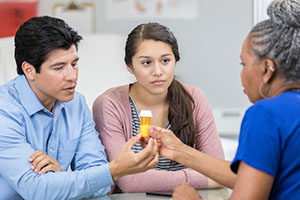Taking an Active Role in Your Medicines
Take the time to learn about your medicine. For instance, why are you taking it? What does it do? Work with your healthcare providers to get the answers you need.

Ask questions about your medicine
Find out the following information:
-
What is the name of the medicine?
-
Is there another way to treat my condition?
-
If I take several medicines, do I really need another medicine?
-
Why do I need to take it? When should I take it?
-
How should I take it: with water? with food? on an empty stomach? Is it safe to drink alcohol with this medicine?
-
How much do I take?
-
What do I do if I miss a dose?
-
What side effects could it cause and which ones should I call the healthcare provider about?
-
Are there any foods, liquids, or medicines I should not have while taking this medicine?
-
Will this medicine change how my other medicines work?
-
How long should I take each medicine? Am I taking medicines I no longer need?
-
If I no longer need this medicine, how do I dispose of it safely? See the FDA website for information.
Take an active role
Actions to take include:
-
Fill all your prescriptions at the same pharmacy. This keeps your medicine history in one place.
-
Talk to the pharmacist. Make sure you understand how to take each medicine. Ask for a fact sheet about each one. If you use a mail order pharmacy, read any written material that comes with the medicines, even if you have taken it before. There may be new information that you need to know.
-
When you're given the medicine, ask your pharmacist if you don't understand the directions. For example does four times a day mean every 6 hours around the clock, or just when you're awake?
-
Tell your healthcare provider and pharmacist about all the prescription and over-the-counter medicines you take. This includes vitamins, nutrition or health supplements, alcohol or other drugs, and herbal remedies.
-
Tell your healthcare provider and pharmacist if you have any health conditions or allergies to any medicine or food, or if you are pregnant or breastfeeding.
-
Keep a list of all your medicines. Keep a copy in your wallet or in a secure app on your electronic device. Let family members know where to find a list of your current medicines. Use the sample below as a guide for the type of information needed.
-
Bring all of your medicines and supplements to your visit. This will help your provider confirm all the medicines you take.
-
Know when your medicine needs to be refilled so you don't run out. Using a medicine planner is a good way to see how many pills you have left. Writing a reminder on your calendar or setting an alert on your smart device such as your smartphone are other ways to make sure you don't run out. Some pharmacies offer automatic reminders as part of their service.
Sample list
Name of medicine:

Taken for:

Dose:

Time(s) to take it:

When to refill:

Online Medical Reviewer:
L Renee Watson MSN RN
Online Medical Reviewer:
Marianne Fraser MSN RN
Online Medical Reviewer:
Raymond Turley Jr PA-C
Date Last Reviewed:
8/1/2023
© 2000-2024 The StayWell Company, LLC. All rights reserved. This information is not intended as a substitute for professional medical care. Always follow your healthcare professional's instructions.